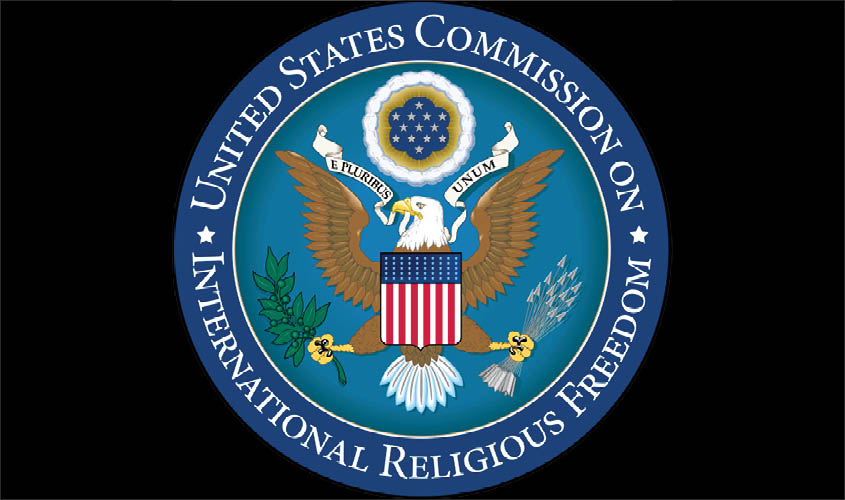USCIRF for targeted sanctions against India for religious freedom violations

 State Department says independent commission’s report “not entirely conclusive”
State Department says independent commission’s report “not entirely conclusive”
Accusing India of engaging in systematic, ongoing, and egregious violations of religious freedom, a bipartisan Congressional commission has asked the Biden administration to impose targeted sanctions on responsible Indian government agencies and officials.
The United States Commission on International Religious Freedom (USCIRF), in its annual report released on May 1, also recommended designating India as a “country of particular concern,” or CPC with 16 other nations.
Read: India slams USCIRF report on religious freedom in India (November 25, 2022)
Suggested sanctions included freezing those individuals’ assets and/ or barring their entry into the United States under human rights-related financial and visa authorities, citing specific religious freedom violations.
USCIRF also asked the Biden administration to raise religious freedom issues in the US-India bilateral relationship and highlight concerns through hearings, briefings, letters, and congressional delegations.
Asked whether State Department is going to consider including India into the CPC countries as recommended, Principal Deputy Spokesperson Vedant Patel told reporters the “report reflects the importance of religious freedom to the American people.”
“While the report’s recommendations for designations overlap for some extent with the State Department’s lists of Country of Particular Concern, it is not entirely conclusive,” he said. “Governments or other entities that have questions or comments about this report should reach out to the commission directly.”
Other USIRF recommendations include “advance human rights for all religious communities in India and promote religious freedom, dignity, and interfaith dialogue through bilateral engagement and in multilateral forums.”
It also asked the US Congress to condemn ongoing religious freedom violations and support religious organizations and human rights groups targeted for their advocacy of religious freedom.
The report suggested that in 2022 religious freedom conditions in India continued to worsen. Throughout the year, the Indian government at the national, state, and local levels promoted and enforced religiously discriminatory policies, including laws targeting religious conversion, interfaith relationships, the wearing of hijabs, and cow slaughter, which negatively impact Muslims, Christians, Sikhs, Dalits, and Adivasis (indigenous peoples and scheduled tribes).
Read: Religious freedom, related human rights in India under ongoing threat: USCIRF (November 24, 2022)
The national government also continued to suppress critical voices—particularly religious minorities and those advocating on their behalf—including through surveillance, harassment, demolition of property, and detention under the Unlawful Activities Prevention Act (UAPA) and by targeting nongovernmental organizations (NGOs) under the Foreign Contribution Regulation Act (FCRA), it said.
The Indian government invoked the UAPA and the Sedition Act throughout the year to target freedom of religion and expression, creating an increasing climate of intimidation and fear, the report said. Authorities surveilled, harassed, detained, and prosecuted a number of journalists, lawyers, rights activists, and religious minorities advocating for religious freedom.
Hundreds of cases remained pending against individuals for involvement in the 2019 peaceful protests against the Citizenship (Amendment) Act (CAA), which provides a pathway to citizenship strictly for non-Muslims from Pakistan, Afghanistan, and Bangladesh.
As of 2022, only 92 of more than 700 cases had reached trial, and many of those arrested under the UAPA continued to languish in jail. During India’s fourth Universal Periodic Review (UPR), United Nations (UN) member states emphasized protections for religious minorities and expressed concern over the broad application of India’s “anti-terror” laws. Additional official efforts, such as the National Register of Citizens (NRC) process in Assam, also aimed to identify “undocumented” Bengali-speaking Muslims.
The continued enforcement of discriminatory laws facilitated a culture of impunity for widespread campaigns of threats and violence by mobs and vigilante groups. In March, for example, Karnataka’s state government issued a hijab ban in public schools, the report suggested.
Read: USCIRF flags India for violations of religious freedom (April 26, 2022)
Despite widespread protests and instances of violence, state high court judges upheld the ban, agreeing with the government’s argument that the hijab is not essential to practicing Islam.
India’s state governments also continued to pass and enforce anti-conversion laws, currently existing in 12 states, including legislation in multiple states aimed to prohibit and criminalize interfaith marriages.
Public notice requirements for interfaith marriages imposed in 10 states have, at times, resulted in violent reprisals against couples. The ruling Bharatiya Janata Party (BJP) committed to enforcing harsher penalties for interfaith marriages in its 2022 election manifesto for Uttar Pradesh, the report said.
Violent attacks were also perpetrated across India under the justification of protecting cows from slaughter or transport, which is illegal in 18 states.
Examples of violence against Christians, Muslims, and Dalits around suspicions of cow smuggling were reported in Bihar, Uttar Pradesh, and Delhi. In August, BJP member Gyan Dev Ahuja was recorded publicly calling for his listeners to “kill anyone involved in cow slaughter.”
Throughout the year, destruction of property—including places of worship in predominantly Muslim and Christian neighborhoods continued, it said. In June, local authorities demolished the homes of three Muslim families in Uttar Pradesh following protests against derogatory language used by members of the BJP.
Hindu nationalists bulldozed a Catholic center near Mangalore in February and attacked, looted, and destroyed the homes of hundreds of Christians in December for their refusal to convert to Hinduism, it said.
Read: US commission seeks sanctions on Indian agencies over ‘violation’ of religious freedom (May 2, 2023)
In addition, at least four madrasas (Islamic seminaries) were demolished following a statement in May from the Chief Minister of Assam that madrasas should be eliminated.
Social media platforms continued to facilitate widespread disinformation, hate speech, and incitement of violence toward religious minorities. In February, Twitter removed a caricature shared by the verified account of Gujarat BJP depicting Muslim men hung by a noose, according to the report.

